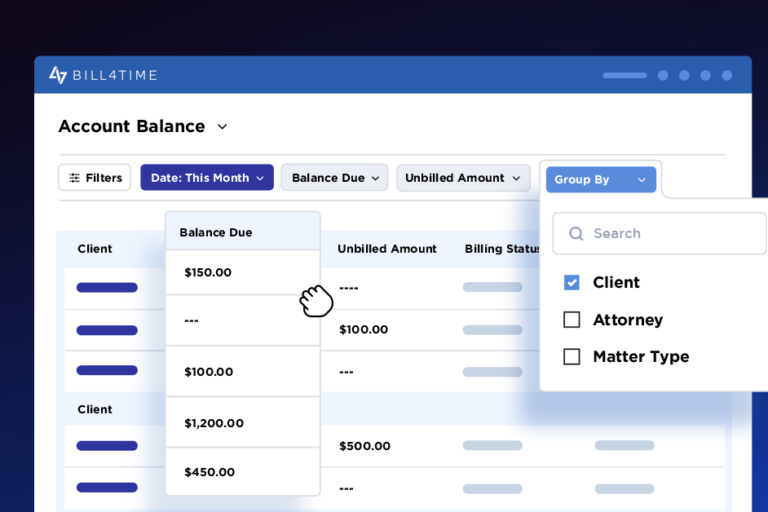
How do Lawyers Calculate Their Time and Get Paid for Every Minute?
10/24/2025 By Clare Sheehan
Time is the engine propelling profitability in any legal practice. Every task translates into the billable time that sustains all operations. But accurately capturing, categorizing, and analyzing that time can be more complex than it seems. Below, we’ll break down how attorneys calculate their time, the common benchmarks that shape billing goals, and how attorney time and billing software ensures every minute gets accounted for and paid.
Want More? Unlock how to benchmark law firm billing rates and more tips in our attorney billing cheat sheet.
Breaking Down Legal Billable Hour Basics
The billable hour system assigns monetary value to an attorney’s time. Whether you’re charging $200 or $600 per hour, that time is divided into smaller increments, often six-minute increments, to capture the full value of your work. For example, if you spend 18 minutes drafting a contract clause, that’s 0.3 hours of billable time. Over the course of a month, those fractions of hours can add up to a significant portion of firm revenue. Here’s an attorney billable hours example:
| Task | Time Spent | Billed Time | Hourly Rate | Billed Amount |
| Drafting contract | 36 minutes | 0.6 hours | $250 | $150 |
| Client call | 12 minutes | 0.2 hours | $250 | $50 |
| Legal research | 48 minutes | 0.8 hours | $250 | $200 |
While it’s common to measure success by billable hours, there’s an important distinction between billable hours vs actual hours. Not every minute of your workday can be billed—administrative tasks, client development, and professional training all count as actual work, but not billable time. That’s why automating as many non-billable tasks is so crucial. Bill4Time helps firms with every aspect of time tracking and legal reporting, so you can visualize how much of your day goes toward revenue-generating activities and how much gets consumed by non-billable tasks that could be streamlined, giving you more time back and more money in the pipeline.
How Often Should Attorneys Review Their Time Entries?
A consistent review process is key to accurate billing. Attorneys should review their time entries daily to ensure completeness and weekly to spot trends or discrepancies. Waiting until the end of the month often leads to underreporting and “time leakage.” With Bill4Time, you can set reminders to review, edit, or approve entries in real time. Built-in reports highlight missing or inconsistent time logs—so nothing slips through the cracks before invoicing.
How Many Billable Hours Should a Firm Target Annually?
The average billable hours for attorneys per month varies by firm size and practice area, but most full-time attorneys aim for around 140–160 billable hours per month—or roughly 1,700–1,900 per year. But pure volume isn’t the only metric that matters. Firms should focus on effective billing rate—how much billed time actually converts to revenue after write-downs or collections. Bill4Time’s reporting dashboard helps you monitor both total hours and billing realization, giving firm leaders the visibility to set realistic goals and measure performance over time.
How Can You Evaluate Attorney Billing Frameworks?
Even with accurate time tracking, outdated law firm billing practices can limit your firm’s growth. Regularly evaluating how your firm bills, collects, and reports can reveal new efficiencies—and more profitable pricing opportunities. Here are a few questions to consider:
- Do your billing policies align with your firm’s strategic goals?
- Are your collection rates and realization rates trending upward or stalling?
- Is your current billing process transparent and client-friendly?
- Could alternative pricing models (flat, hybrid, subscription) improve cash flow?
Understanding these patterns helps firms strike the right balance between productivity, client satisfaction, and profitability.
Ready to take a closer look at your billing strategy?
Download Matching Your Firm to the Right Legal Billing Framework—our free white paper that walks you through how to assess, modernize, and optimize your billing model for better performance and growth.

How Do Alternative Fee Arrangements Affect Billable Hour Tracking?
Alternative Fee Arrangements (AFAs)—like flat fees, subscription pricing, or blended rates—are gaining traction as clients seek more predictability. But even when billing isn’t strictly hourly, tracking attorney time still matters. Time tracking under AFAs helps firms:
- Evaluate profitability across pricing models.
- Justify flat fees with data-backed insights.
- Understand how resources are being allocated.
Flat fees, hourly rates, and hybrid options all have their place—but knowing when to use each one is where the real advantage lies. Download our Hybrid Pricing Guide to learn if a hybrid pricing structure will work for your clients and your bottom line.
Avoiding Time-Leakage
Without enough guardrails in place, small, untracked tasks fall through the cracks. A few minutes here and there might not seem like much, but across a year, lost time can equal tens of thousands of dollars in missed revenue. To minimize time-leakage:
- Capture time as you work. Use a built-in timer or mobile app instead of trying to recall the day later.
- Categorize tasks properly. Make sure every minute is attached to the right client or matter.
- Automate repetitive billing tasks. Automation keeps entries organized and consistent.
Implementing contemporaneous tracking and automated time capture helps attorneys stay accurate and efficient—so no billable minute goes unrecorded.
What Software Offers the Best ROI for Time Tracking?
Choosing the right legal billing software isn’t just about features—it’s about measurable return on investment. The best system reduces admin time, prevents billing errors, and improves collection rates. Here’s a quick checklist to help evaluate ROI for time-tracking software:
- Ease of use: Is time tracking fast and intuitive across desktop and mobile?
- Automation: Does it auto-capture, round, and categorize time entries?
- Reporting: Can you track billable vs non-billable hours at a glance?
- Integrations: Does it sync with your accounting and payment platforms?
- Compliance: Are audit trails and trust accounting handled properly?
- Support: Is onboarding smooth, with ongoing client support available?
Take Control of Every Billable Minute
Tracking your time can’t be tedious or uncertain, especially when your competition is focused on streamlining every workflow. Whether your firm bills hourly, flat fee, or through a hybrid model, having accurate, automated data ensures you’re compensated for every minute of your effort. With Bill4Time, attorneys can:
- Log time in real time, from anywhere
- Generate invoices instantly
- Analyze performance with easy-to-read reports
Start your free trial today and experience the smarter way to manage your time, billing, and profitability.



